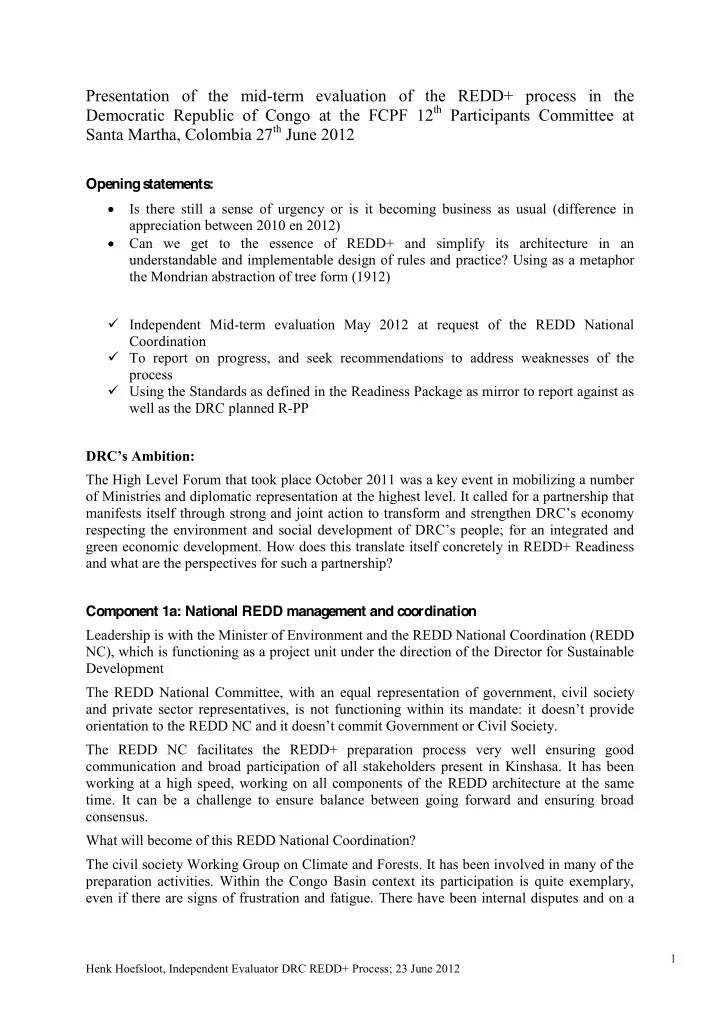

Presentation of the mid-term evaluation of the REDD+ process in the Democratic Republic of Congo at the FCPF 12 th Participants Committee at Santa Martha, Colombia 27 th June 2012 Opening s tatements : � Is there still a sense of urgency or is it becoming business as usual (difference in appreciation between 2010 en 2012) � Can we get to the essence of REDD+ and simplify its architecture in an understandable and implementable design of rules and practice? Using as a metaphor the Mondrian abstraction of tree form (1912) � Independent Mid-term evaluation May 2012 at request of the REDD National Coordination � To report on progress, and seek recommendations to address weaknesses of the process � Using the Standards as defined in the Readiness Package as mirror to report against as well as the DRC planned R-PP ��������������� The High Level Forum that took place October 2011 was a key event in mobilizing a number of Ministries and diplomatic representation at the highest level. It called for a partnership that ������������������������������������������������������������������������������������������� respecting the environment �������������������������������������� ; for an integrated and green economic development. How does this translate itself concretely in REDD+ Readiness and what are the perspectives for such a partnership? Component 1a: National REDD management and coordination Leadership is with the Minister of Environment and the REDD National Coordination (REDD NC), which is functioning as a project unit under the direction of the Director for Sustainable Development The REDD National Committee, with an equal representation of government, civil society ���������������������������������������������������������������������������������������������� orientation to the REDD NC �������������������������������������������������� The REDD NC facilitates the REDD+ preparation process very well ensuring good communication and broad participation of all stakeholders present in Kinshasa. It has been working at a high speed, working on all components of the REDD architecture at the same time. It can be a challenge to ensure balance between going forward and ensuring broad consensus. What will become of this REDD National Coordination? The civil society Working Group on Climate and Forests. It has been involved in many of the preparation activities. Within the Congo Basin context its participation is quite exemplary, even if there are signs of frustration and fatigue. There have been internal disputes and on a 1 Henk Hoefsloot, Independent Evaluator DRC REDD+ Process; 23 June 2012 ¡
number of dossiers they were, in their own experience, insufficiently consulted by the REDD NC before presenting proposed texts to the National REDD Committee for validation. Private sector has so far been little involved: the preparations for the Forest Investment Programme operational plans are a first opportunity to practically seek its involvement. REDD+ preparation is still very much a Kinshasa process, with little capacity developed at the provincial and local levels, with the exception of where there is a REDD+ pilot project or FIP investments. Assessment: The evaluation mission finds that the REDD+ process is close to partially meeting the standard as defined in the R-Package at the National (Kinshasa) level. The principal challenges from a process management, coordination and consultation perspective are: 1) a functional National Committee that commits and is capable of mobilizing intersectoral government and civil society; 2) A real decentralization of REDD preparation and future implementation capacity; 3) Continue to ensure a strong National Coordination unit; 4) Ensure good communication and joint learning from early field experience There were a number of people talked to that suggested to house REDD+ in the Prime ����������� ������� ���������� ���� �������� ��� ���� ��������� ����� ���������� ������ ������ effectively have mobilized the entire government. There are two sides to the need to decentralize REDD. One, without decentralization at an early stage, REDD in DRC remains a paper tiger disconnected from reality with little direct investment in actually supporting action to reduce DD. However, on the other side REDD+ is still not very concrete and fraught with uncertainties at the international level. There is a risk here of raising expectations too high. At the same time the fragile political context in DRC makes far reaching decentralization a long term process. It is important to establish a good balance here and develop a shared strategy on decentralizing REDD+. Component 1b: Cons ultation, participation and outreach Within Kinshasa quite exemplary with REDD international university, more than 300 civil servants and civil society actors involved the Thematic coordination groups, workshops on a variety of REDD issues and generally intensive interaction between stakeholders. However, there has only been punctual outreach into the provinces. There has been insufficient budget for the planned for consultations campaigns, for the Thematic Coordination groups and for the provincial REDD focal points. Within the FCPF funding a larger budget has now been made available for these activities. And, after much effort attracting interest of donors in supporting these activities, Norway has engaged through a new project through UN-REDD mechanism and EU has promised to match these funds. Assessment: as for 1a. There is a real need to go into the provinces and take REDD out of the capital. There has been reluctance with donors to fund these activities. And maybe it was too early. There is now a, still limited, budget available to increase participation and outreach in this big country. This will produce some first result earliest 2013. However, effective outreach to local community and IP and getting their full participation will only happen during the operational planning of REDD and PES initiatives. All of this will be an iterative process. 2 Henk Hoefsloot, Independent Evaluator DRC REDD+ Process; 23 June 2012 ¡
Recommend
More recommend